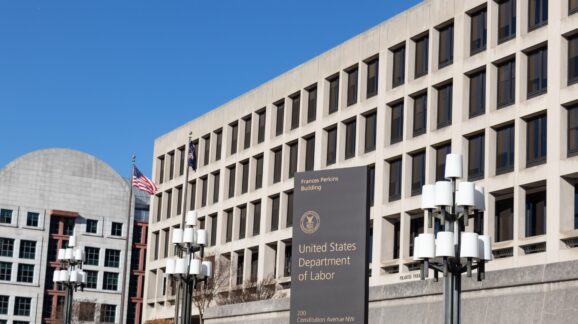Trump picks gig economy fan for DOL’s number 2 spot

Photo Credit: Getty
President-elect Donald Trump has raised more than a few eyebrows in the world of labor policy when he nominated the frankly underqualified one-term Congresswoman Lori Chavez-DeRemer to be labor secretary. He appears to be trying to balance that decision by nominating Keith Sonderling to be deputy labor secretary, the department’s number two position.
“Keith will work with our great Nominee for Secretary of Labor, Lori Chavez-DeRemer, to put our Country and Workers FIRST,” Trump said.
The pick has drawn a positive reaction from the business community. “With his close relationships to the business community and his preference for a deregulatory framework, Sonderling will complement Chavez-DeRemer’s labor-friendly disposition to help achieve the policy objectives of the second Trump administration,” said the management-side law firm Littler.
Sonderling is a former management-side labor attorney who has served in a variety of positions in the government as a Republican appointee. Most notably, he was a commissioner at the Equal Employment Opportunity Commission during the Biden administration. Prior to that, he was deputy administrator of the Labor Department’s Wage and Hour Division (WHD) during the Trump administration. WHD monitors compliance with laws such as minimum wage and overtime
In short, Trump has nominated an experienced hand to be the person that runs that the Labor Department’s day-to-day activities. The department has 17,000 workers and a $14 million budget and includes such divisions as Occupational Safety and Health Administration and WHD.
Sonderling has a reputation as a hands-on guy. Littler said he had “a track record of prioritizing clear guidance on both traditional issues such as those found in wage and hour law or occupational safety and cutting-edge issues such as the use of AI in the workplace.”
WHD, for example, issued 80 opinion letters, which are official instructions on how to comply with laws in specific instances, during Sonderling’s time as deputy administrator. Business groups appreciated the letters, since they allowed them to avoid legal risk. “An important role of the U.S. Department of Labor is to ensure that employers who want to do the right thing have clear compliance assistance,” Sonderling said at the time.
During the Biden administration, only six letters were issued, making it much harder for business to avoid running afoul of regulators.
Sonderling has also been supportive of the gig economy. He was the author of a 2019 Wage and Hour Division opinion letter which stated that workers offering services through a “virtual marketplace platform” (i.e., an app) were independent contractors, not traditional employees. This allowed app-based employers to continue to function as they had. Their business model is built around using short-term freelance workers, not full-time employees. The guidance letter irritated unions, who wanted the workers to be classified as traditional employees. That would have subjected the companies to numerous workplace laws, including union-related ones.
The Biden administration withdrew the guidance two years later. Sonderling’s return indicates that the Labor Department will shift back to encouraging these new emerging companies.